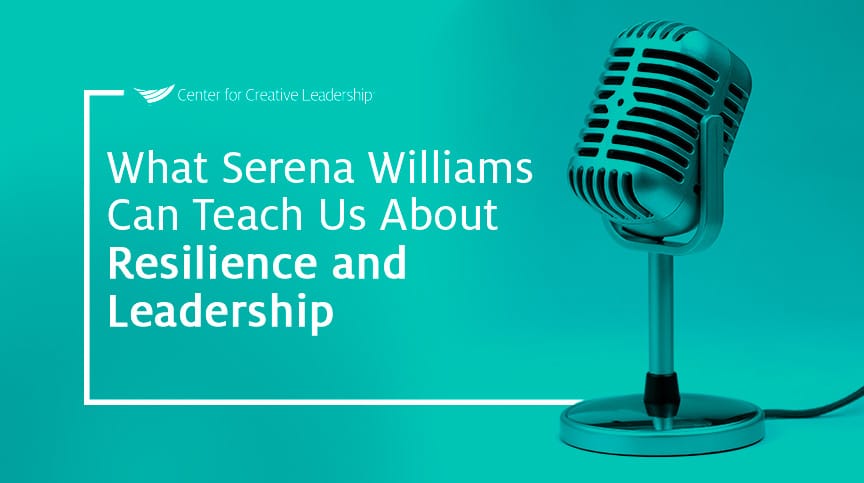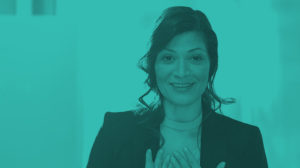- PODCAST
Lead With That: What Serena Williams Can Teach Us About Leadership & Resilience

On August 9th, 2023, one of the best athletes to ever grace the world of sports talked about evolution … an evolution away from the game of tennis and onto so many more things. Tennis superstar Serena Williams had begun her farewell tour.
Serena became a professional tennis player at the age of 14, and won her first Grand Slam title at 17, at the US Open. Since then, she has won more Grand Slam singles titles (23!) than any other man or woman in the Open era. It’s easy to forget she has also won 14 Grand Slam Doubles titles with her prolific tennis star sister Venus, along with 3 gold medals in Olympic doubles.
Not to mention, she’s won nearly $100 million in prize money and is now taking her tennis success into venture capitalism, with Serena Ventures, a small VC firm with investments in MasterClass, Impossible Foods, and Noom, among many others.
There’s so much leadership wisdom to explore here: What philosophies guided her on the way to success? How has her ability to bounce back shaped her? How is she going to lead Serena Ventures and her other ventures with family and children?
In this episode of Lead With That — part profile, part exploration — we discuss the remarkable and resilient Serena Williams and leadership, and encourage listeners to lead with that.
Listen to the Podcast
In this episode — part profile, part exploration — Allison and Ren discuss all things Serena Williams, and encourage listeners to lead with that.
Interview Transcript
INTRO:
Welcome back to CCL’s podcast, Lead With That, where we talk current events in pop culture to look at where leadership is happening and what’s happening with leadership.
Ren:
In August, one of the best athletes to ever grace the world of sports, talked about an evolution…an evolution away from the game of tennis and on to so many more things. Tennis superstar Serena Williams has begun her farewell tour with tennis. And while she didn’t say she’ll definitely retire after her potential final U.S. Open this year, she did say that countdown has begun. And by the time this podcast reaches your ears, maybe it’ll be official.
Now Serena Williams became a professional tennis player in 1995 at the age of 14, and 3 years later, she won her first Grand Slam title at 17 at the U.S. Open. And since then, Serena Williams has won more Grand Slam titles than any other man or woman in the Open era, 22 plus that first one, making it 23.
And it’s easy to forget she’s also won 14 Grand Slam Doubles with her prolific tennis star sister, along with 3 gold medals in the Olympics too, for doubles. Not to mention, she’s won nearly $100 million in prize money and has taken her tennis success in a venture capitalism with Serena Ventures, just a small VC firm with investments in impossible foods, in Noom and, oh yeah, that unicorn, MasterClass.
And so with such a resume, we had to stop and take a gander. Not only is it worth talking about Serena’s athletic prowess, but we had to explore her leadership prowess as well. What philosophies guided her on the way to success? How is she going to lead Serena Ventures and how is she going to lead the other ventures of Serena through her family and her children? So today, part profile part exploration, we talk about Serena Williams.
Welcome back everyone. I’m Ren Washington, as usual, I’m joined with Allison Barr. Allison, is Serena Williams the best athlete ever?
Allison:
I’m laughing because I’m going to say yes to that, but I’ll put my objective hat on first.
Ren:
You’ll try.
Allison:
And full transparency, I love tennis and I would give a lot to go see her play live for the last time. And yes, I would say she is right now, the greatest athlete of all time.
Ren:
Right now, the greatest athlete of all time. And what makes her the greatest athlete of all time?
Allison:
Well, considering all of the things that you said, and we could talk about all of her accomplishments, we could literally only talk about that in the next roughly 30 minutes that we spend together and we wouldn’t cover them all. And you didn’t cover them all for that reason, because there’s so many. I think there are a lot of external factors that she’s had to deal with that prove her incredible amount of determination, resiliency, focus. Let’s not forget that playing singles and doubles, they’re different games. They’re completely different games. And for her to be the best in the world at both is incredible and truly the best in the world. So if you think about a sport like football, which I also like, I like football, but U.S. football is played in the U.S. and it has a season. Tennis does not have an off season. So there’s one differentiating factor there. It’s also unique in that it doesn’t allow for on-court coaching.
And let us not forget that Serena Williams won a Grand Slam while she was literally pregnant. She also won a title after giving birth via C-section and overcoming her second, not her first, her second pulmonary embolism, which people die from. So I think there are a lot of, again, external variables, external factors that she has overcome and still remaining the greatest tennis player in the literal world.
Ren:
Literally pregnant and literal world. I won’t get into the idea of metaphorical pregnancy and the metaphorical world. Just teasing. I just talk to my kids all the time about…
Allison:
I mean, you could be pregnant with an idea.
Ren:
Okay, so that’s what we mean by that. Well, it sounds she’s almost these superhuman traits, and then I wonder, so I can’t imagine our listeners, I’m like, what’s the secret? All right, well be superhuman. So instead maybe, what do you think might be one of her most defining characteristics? You said quite a few things about what makes her maybe separate from the rest. But if you had to name one thing, what do you think it’d be?
Allison:
Gosh. Without being her sports psychologist, which would be a really incredible job to have. I think from the outside looking in, her mental resilience is the best word I can come up with, her mental game so to speak is likely one of the best in the world, if not the best in the world.
Ren:
And from what you know of her and in considering all you may have seen throughout her career, how did she hone that highest level of resiliency? Yes, we’re not her sports psychologist, but we study effective people and we talk to effective people every single day. What do you think contributed to her resilience?
Allison:
I’m sure there’s a lot of factors that I’ll never know. However, I found actually a quite older article in which she was interviewed. And she said that the 5 factors of her maintaining or excelling her mental game are managing her high expectations that can undermine her confidence. She expects to win every single match. She expects to win every single Grand Slam that she ever plays. And that’s too high of an expectation and it can undermine her confidence, so that would be one. She also said learning how to focus on the process instead of the results, which I suppose leads directly into that first one. Being proactive about her confidence and not leaving it to chance, learning how to take her training into the match and staying composed in challenging situations. Staying composed, which I think all of that can translate to leadership. As I’m looking at this, none of those are specifically physical or none of those are specific to tennis.
Ren:
Which one do you think is most important?
Allison:
Oh gosh, that’s tough.
Ren:
Today. You could change your mind tomorrow, but pick one right now.
Allison:
Probably staying composed in challenging situations. What would you say?
Ren:
Yeah. Well, I can’t remember the list off of the top of my head, but maybe let’s just stay with composure. Why do you think it’s so important?
Allison:
Well, I think it can be normal when you’re faced with loss or faced with heavy criticism to focus only on that versus what she said she does is she’ll go back and re-watch a match for example, and diagnose and watch everything that she does so that she can do it differently should it come along the next time. And so if I think about leaders in the workplace, we don’t have access to watch ourselves necessarily. Maybe some of us do. I don’t know. But it’s really easy to fall and to focus on the obstacles that we face and take ourselves out of composure versus, how can I do this differently? Takes an extreme amount of self-awareness and composure to be able to do that.
Ren:
And I too, when I think about the ability to keep yourself on your side is sort of what I look at it like the composure, there’s already so many countless factors working against you and the challenges that you’ve got overcome might pile onto it with your own kind of ethos, where you fall down and you look at yourself and it’s that self-criticism or judgment as opposed to saying, okay, what do we do better? And how do we get back up? I think something you say there resonates with me because I notice in her reflections, Serena Williams, I’m a good mimic, she said. Growing up, she watched Pete Sampras Monica Seles. She studied them. She listened, she watched, she learned and then she applied all those things. And she even said too, had she not been in Vida’s shadow when she was young, she’d never be who she is today.
And so there’s something around that idea of being a keen observer of behaviors. You say we can’t watch the tape. And I always think, I love that idea that nothing hides from the eye in the sky an old football coach once said from us. But what you can observe are the people around you. Or maybe even something that I’m a firm believer in is observing the people who are the very best at what they do in your work. And so I don’t know if that’s a major contributing factor to cultivating resilience. But when I think about composure, when I think about cultivating best practices, any leader, if you aimed to want to get better at something, I would say, look around and look at the very best people that do that thing and study. And maybe practice some humility and be like, okay, I don’t know all of the stuff, maybe there’s something to learn from this person who excel. And now Serena is the person who excels. And so I wonder too, how is she going to communicate her success?
Allison:
How could she? She’s decades into this sport, right? So there’s probably-
Ren:
Yeah. Yes. Many. Yeah.
Allison:
I would imagine… Maybe not. I mean, I was going to say, I would imagine there’s probably so many different learnings to share, so many different formulas that she used, but maybe not. Maybe she’s had the same mentality the whole time, because you said she won her first slam when she was… Did you say 17? Is that what you said? 17 years old.
Ren:
17, that’s right.
Allison:
She’s 40 now. And so whatever she was doing has been working.
Ren:
Well. That’s interesting. I think she might even reflect on her career trajectory that I wonder what her peaks and valleys would be. But when I think of excellence and when I think of people like her and anyone at the heights of their game. And I talk to leaders all the time or people that we do this work with, and I think that a big challenge for leaders and the big goal and objective is to be able to articulate mastery. She’s got her venture capital firm and they invest in MasterClass. And if you’ve ever taken a MasterClass, we get these seminal idols around every industry and artistry and all these places around the world and they sit and they teach. But more than teach, they articulate their lessons, their skills, the things they’ve gone through. And so it’s going to be really interesting to see Serena, if she so desires through her family or through any other mechanism, to articulate those things that work.
Like you said, whatever she’d been doing, she’s been working. And Serena might even reflect that she picked up her first tennis racket, her dad says she was 18 months old, but she thinks she was younger than that. And so, it’s been working but how do you articulate 38 years of success? There’s so much there. It can’t all be the best thing.
Allison:
Yeah. I think some of her trademark quotes and responses in interviews, whether she’s won or lost, seem to center around believing in yourself when nobody else does. You need to stick with it. You need to work hard despite failures. You’re going to have setbacks and I don’t like to lose. And she has one where she says, I don’t like to lose at anything, yet I have grown the most, not from victories, but setbacks. And I think there’s a certain lens or value if you will, around how she handles setbacks that seems to be a theme. And I think if I can, again, translate that to the career and I think about myself and my younger career when I went for promotion and I didn’t get it, or I applied for a role and got rejected and just being crushed by that.
And that’s probably relatable for a lot of people. But how can you take something like that and grow from it? And it might mean looking to the greats and she’s admittedly looked to Steffi Graf and a lot of other “greats” to help her learn and be who she is. She’s also very humble. She also has recently said that she looks to some of the younger kiddos out there, Sloan Stevens, Naomi Osaka, some of these other athletes, Madison Keys, to keep her on her toes. So I think she does a really good job at understanding to look to new and up and coming trends, up and coming players to learn from those as well as to learn from those who are retired.
Ren:
Yeah. You name those names and I can’t help but thinking, none of them are as good as Serena. There’s something really magical about her. And magic for me seems to be a combination of hard work, diligence, focus, and luck. A lot of things have to happen to keep you healthy and on the journey. But something, I think, that she was always able to do inward and you said earlier at the top, when you were talking about some of the things that separates Serena’s expectation of self.
And there’s a couple of things I want to explore there. One, I agree, I think that’s one of the things that drove her and drives her. She’s even said the essence of being Serena is expecting the best from herself, and proving people wrong. And then I think about this idea of that expectation and so high a level of expectation where she doesn’t want to lose at anything. And maybe that’s the reason why she’s got 23 Grand Slams. And so I wonder, is that level of expectation healthy?
Allison:
Yeah. And I think that’s why I read that one quote to you. Part of her mental game is learning how to manage her high expectations because it can undermine her confidence, which I thought was really interesting.
Ren:
I’d love to talk to her about that because… And you know what, Allison… All right, everyone, I’m going to let you into the little secret. I have this challenge with incredibly successful people who when they get to the mountaintop, they turn around and they’re like, hey, I’ve made it. And by the way, now that I’m up here, you shouldn’t do what I did to get up here. You shouldn’t do it at all. Get off the path, they’re shouting down from the mountaintop. And she thinks about this like, I wish I didn’t have this level of expectation for myself, or I thought more about the journey than the destination. And maybe that’s just the commentary of Nirvana when you reach the apex of your life. But for those people who are charging hard and playing tennis since they’re 2 years old and looking to be like her, how do you swallow, hey, don’t do what I did do what it seems to take to be excellent, it’s not worth it?
Allison:
Yeah. I didn’t hear her say that. Are you saying that you read or heard her say a version of that?
Ren:
It’s a lot of conjecture here, sort of like my thing with Ariana Huffington and this whole Thrive resilience point of view of hers. Now that she’s made it, she’s talking about doing behaviors that if we inhabited, we wouldn’t be Ariana Huffington. Some of the things I think for Serena reflecting on the expectation of things like that, or even the talk around, I’ve heard her say, I don’t want my daughter to play tennis, not at the level that Serena did because she knows the cost. And yet I look at Serena and I think, well, hasn’t tennis given you everything? It’s just an interesting cognitive exploration between the realization of all that I’ve earned, maybe I wouldn’t recommend that path. But if I’m on that path, how do I accept that?
Allison:
Well, it’s like a philosophical debate in a way. What do you mean tennis has given her everything? She’s worked for all of that. And again, we’ll never know everything that’s gone on in her life. But pulmonary embolisms, coming close to death is I would say, you’d probably want to avoid that. She’s experienced a lot of really horrific racism being in a sport that is traditionally welcomed the white male community. Its rules are its rules still founded in that nature. And they’re very open about that. That’s not a secret. For example, one of the reasons why women don’t play 5 sets is not because the women don’t want to, it’s because the Association won’t change that, they won’t change it. They won’t, so that’s a whole other path to go down.
But I think she’s probably experienced a lot of hardship, like a lot of us, but in a lot more dramatic ways. And so I would assume that she means she doesn’t want her daughter to experience those types of health issues, those types of conflicts because of the color of her skin, because of the fact that she’s a girl, she’s a female, and so on and so forth. I don’t know. What do you think?
Ren:
Well you said a couple things around, what do I mean by tennis has given her everything? And a thoughtful reflection, Allison, around, well, it’s given her a lot and it’s contributed to some good things and bad things. And maybe the reflection is more that I think when you get to a certain point in your career or in a certain point in the work you’re doing you start to lift your gaze into some other things that matter. We have these conversations with people all the time around legacy, especially senior leaders around, they start to think, well, I’m getting towards the end, what are I going to leave behind? And it’s interesting to hear. And if you want to hear it from Serena herself in this Vogue article, which is why as you can see her right now, it’s closer to the end of August at the time we’re recording.
So if you’re walking through an airport, maybe you can catch this Vogue article. It’s a very beautiful title shot. And then when you open up the cover, you can see her daughter Olympia holding her dress off to the side. It’s really adorable. But in this reflection, she recognizes and admits that she’s pissed about retiring. She doesn’t want to quit, but she also recognizes that things have to ship. She’s 40 years old, a dinosaur in a lot of these professional sports. It’s hard to do it. But she also reflected maybe if I was a man, she cited Tom Brady, maybe if I was Tom Brady, I’d still be playing. But she thinks, well, what about my family and the closeness that she has with her daughter… She talked about maybe only once since her daughter’s been born, has she spent more than 24 hours away from her. And too, she wants to give her daughter a sibling.
And so it’s interesting to hear and reflect on Serena Williams and this tension she’s experiencing where maybe unlike Cheryl Sandberg, she’s saying I can’t lean in, I’ve leaned in so much I don’t have much left. I want to diversify my life before there’s nothing left. And so tennis has to be one of those things that goes. It’s interesting to hear her reflect on, dammit, I wish I didn’t have to quit.
Allison:
Yeah, it is interesting. And I would imagine having to weigh your options in that respect is incredibly hard. And as per usual, there’s a lot we’ll never know that went into that decision for her. There’s just a lot that we’ll never know. But if you think of it from a broader perspective, I’m not sure if this is the same article that I’m referencing that you just said, but there’s an article that says, the title of it is, “If Serena Williams Can’t Have It All, Then Who Can?”
Ren:
Interesting.
Allison:
Maybe it’s different.
Ren:
Different article, different article. Yeah.
Allison:
It’s a different, okay. It’s a different article.
Ren:
Maybe it’s the same.
Allison:
And it begs a broader question. Women always get asked that question. Women always get asked, how do you balance work and family? Have you ever been asked that, Ren?
Ren:
Probably not at the volume of any of my colleagues. I feel like I must have been, but I can get your sentiment. It’s not something that regularly comes up in conversation. No.
Allison:
Yeah. And so I sensed… And again, I wish I could say, I know Serena Williams so deeply that I know where she was coming from.
Ren:
Yeah.
Allison:
I wish I could say that, but I sense maybe a little frustration around gender roles, gender norms. It sounds to me as if she wants to have her own biological child, so that does put a strain on some certain decisions that she has to make. And I sense a little frustration around, men don’t get asked these questions for one, and it’s because to the Tom Brady’s in the world, they get to give up, they get to count on their wives or their partners, rather to be the caretaker of the children. And so I sense a little bit of that as well.
Ren:
One might ask, why can’t she count on her husband to be the caretaker?
Allison:
I don’t know. And I’m by no means saying that she cannot. So to her husband…
Ren:
Don’t @ her.
Allison:
Her husband’s probably listening.
Ren:
Yeah. Yeah, totally. The Williams are listening.
Allison:
Don’t block me on social media. Don’t block me. But there’s a broader cultural societal norm within that. Yeah, definitely is.
Ren:
I maybe too. Yeah. I think you’re right. There’s some frustration talking about, maybe the terrain’s not the same. But I think there’s also an admission of a recognition that whether or not she’s enabled to have all of the things… I think, like you said, because she’s interested in having a biological child and in this time in her life that she’s has to choose one or the other. And it’s interesting, I guess until maybe we have bigger conversations of the kinds of behaviors and decisions that we reward than maybe those tensions will persist. And so it’s just really interesting to see this world-class, best in class, almost one of the best to ever do it, still want to do it. And I think a lot of athletes always want to keep playing. But I’ve never heard an athlete in a talk about them evolving, because she doesn’t use the word retiring. But I’ve never actually seen an athlete go, I don’t want to quit.
Allison:
Yeah.
Ren:
It’s not even saying, I don’t really want to leave the game, but I’m leaving it because of these other reasons. It’s not like when someone’s crying and saying I’m going to miss the game and I want to stay, but I can’t play anymore. She’s still incredibly capable. She’s still one of the best tennis players in the world. And it’s like, I don’t want to leave on top. And so maybe that’s another lesson though.
Allison:
Yeah.
Ren:
One of my favorite shows ever was Boardwalk Empire. Have you seen it? You know how I like to ask him about this.
Allison:
Yes, of course. I’ve seen pieces of it.
Ren:
Well, I love it. And they ended early I thought. They had so much more to do. And I remember listening to one of the writers and he said, sometimes you just can’t drain every bit of the story, sometimes you’ve got to end on top. And I wonder if there’s not, too, something around Serena and lessons that we can take where in the frame of it’s about the journey and not the destination that maybe she’s not reached a height, but she’s at the tip of the mountain only halfway there, Dr. Disrespect, that’s for you. But maybe sometimes you got to hang up your spurs and then be okay with that.
Allison:
And to your point, she’s using the language of evolution and the language of evolving and perhaps it’s time for a heavier focus on a different aspect of her life. And again, maybe she doesn’t want to. You can’t give 100% to 2 or 3 different things. So I would imagine it an acknowledgement of that too. You can’t give 100% to tennis and 100% to your family at the same time. That’s not possible. So I wonder if there’s some priorities shift as well. I don’t know.
But in that article that you referenced from Vogue, she also stated that she wants part of her legacy to be the inspiration of every woman out there. And the success of one woman should be the inspiration of the next and that’s her new saying, and she can do that off the court. So you mentioned legacy, if that’s part of her legacy or her desired legacy, that is something that she can certainly do off the court, especially considering all of the business ventures that you mentioned at the beginning of this conversation today. She’s still an incredible business woman. She’s still doing a lot of other things.
Ren:
And I think about her decision to start Serena Ventures and where her career’s going to go. And there’s that awareness of the other. I think we always talk about the importance of self-awareness here just as a leader, being keenly aware of the things that drive you, decisions you make, and why you make them, the triggers you have and how they impact your decision making and your relationships. But then also a recognition of my role in lifting others. I think, I don’t know if it’s an articulated or an inherent drive in her, but this desire to give back some of what she’s got. And it’s fun to listen to her talk about some of how her VC firm makes decisions on support and what she loves about it. And maybe she likes supporting an idea or supporting a person or supporting a young company. But this idea to give back, I feel is a lesson for all leaders and something too, that I find as a pretty standard trend when leaders get to a certain point in their career that they start to remind themselves about always giving back.
And I think too, we do so much work in the equity and diversity and inclusion space. And one of our amazing participants used this metaphor around, we take the elevator up, we’ve got to send the elevator back down for other people. And it’s not just enough to get these certain people visibility or their voices to be heard and then no one else’s voice to be heard. We’ve got to be lifting each other as we climb. And what an interesting idea and something that all of us I think can be asking, What’s the last thing that I did to help someone get to where I am just like someone helped me get to where I am?
Allison:
Can you think of someone who helped you to get to where you are, who was really impactful?
Ren:
Every single day, all the time, yes.
Allison:
Yeah.
Ren:
Every opportunity that I have is because of a relationship that I had or someone giving me an opportunity because we were connected. And even for someone like me, who wants to pretend like I’m a robot who has the smallest inner circle ever, I recognize too that even I flourish with others. And so I think the motivation why we’re here together is to talk about these things because not everyone gets a chance to hear some of the things that we get to hear every day. So I think about it all the time. I imagine the same for you, leaders who’ve given back and making a difference.
Allison:
Absolutely. And sometimes it’s even in the smallest of gestures. I think back to a manager whose super power, if you will, was and probably still is her ability and desire to develop others, every day it was one of her goals to teach somebody something new – and she did. And so I think with that said, there’s probably a lot of leaders out there who have a wealth of knowledge who maybe even just assume that people either know that already or don’t want to hear it. But I think there’s a lot of value in teaching somebody, sharing the wealth, so to speak, teaching somebody some new skill or some new way to become a better leader at the workplace. And oftentimes we’re so driven towards that finish line that we forget to do it. So it’s an important consideration of leadership for sure.
Ren:
In the spirit of that best practice sharing, let’s hypothesize. And let’s say, Serena, you hear that knock on your door, she’s there. And you got a chance. She’s just coming to see you for a minute. She’s like, “What’s up, Allison. I know you’re a big fan, I’m a big fan of yours too. The podcast is killing it.” And then you’re like, cool.
But she’s like, “I have time for one question.” What’s a question that you would ask, specifically as it relates to leadership or the development of people or the development of your humanity. What’s a question, one question you’d love to ask Serena Williams?
Allison:
I only get one question.
Ren:
Yeah, you got to pick.
Allison:
Okay. I would ask her specifically, What is the first thing that you do when you experience a loss? And I don’t mean a grieving type of loss. I mean like a match that you thought you were going to win handily or a match that you were so invested in, or when something goes wrong on the court, where that might throw somebody, what’s the very first thing that you think about?
Ren:
And why are you curious about that?
Allison:
Oh, because I suppose from a personal level, I can ruminate around mistakes and I would love to not do that anymore.
Ren:
Right.
Allison:
Yeah.
Ren:
And I think you highlighted that about her too. Her bounceback, her resilience is a thing that really drew you to her.
Allison:
Yeah.
Ren:
Yeah. It’s funny that you say that because for me, I would ask, What’s the hardest thing about winning?
Allison:
Interesting.
Ren:
Yeah. I think a lot of time and, you just said it too, we’re so focused on the end goal. And I think sometimes winning can be a curse, especially for a young person, especially for the world that the Williams sisters grew up in and just the experience of Serena has had, to have to be continually driven in the face of so much success, to manage that is just… And maybe that goes back to what I was saying earlier. I want to learn from masters and I want to ask them, not only how do you win, but what’s the toughest part about winning? So I’d love to hear just what she would think about that.
Allison:
Yeah. That would be a very interesting perspective. So she has one of her best friends on tour, also retired recently, Caroline Wozniacki.
Ren:
Yeah.
Allison:
And Wozniacki won the Australian Open 2016, maybe 2017, something like that. And she said, there’s all this build up, you win your first Grand Slam, so much emotion. She cried, she collapsed on tour. And then you just go on with it. Then you have the next day. And it’s almost harder that next day, because then you have to go back to putting the work in, which, of course, naturally. And then there’s a lot more pressure for you to keep up with that winning and that championship mentality.
Ren:
Every time I hear about that kind of flow, I’m reminded of this idea that we aren’t the outcome, we are the effort.
Allison:
Yeah.
Ren:
And so maybe going back to Serena in thinking about, I wish I was thinking more about the journey than the end. And maybe with Caroline there too, she’s reflecting on, I put so much pressure on this Grand Slam. I win the Grand Slam and then I wake up the next day and I have to go to tennis practice because I’m a tennis professional, and this is what I do for a living. And then it’s like, well, if you don’t enjoy what you do for a living, and you’re only holding out for that hope of the Grand Slam, then holy crap, what a tough life.
And how many leaders do we talk to too, who are always just waiting for that next thing. Or I’m only doing this for X, Y, or Z, or I’m only in this crappy job for this thing here or this situation I’m waiting for this as opposed to saying, well, what if we intentionally tried to cultivate joy, presence in enjoyment, or pleasure in the things we do every single day, as opposed to hating it all for this thing that might be out there in the future. And then guess what? After you get it, things keep going.
Allison:
Right. Well, with that said, what’s one tip you could offer for leaders out there to do that?
Ren:
For me, I think it’s a little bit twofold. One, I’d say do more of what you value every single day. I think a big takeaway for me around Serena is this idea of, look what greatness looks like and enjoy the practice of cultivating greatness. And in the spirit of keeping your eye on enjoyment in the present, it’s about the skill-building and not where you’re going. Because in the reality, we say at CCL, leadership never stops. It’s not something that one day we’re going to put our hands up and be like, yes, I’ve done it. I’ve won at leadership. I can go home now. It’s more like, what’s the next thing. And if I can enjoy that exploration of what’s next, then maybe I’ll always keep growing and then I won’t have that let down of, oh well, I made it, now what?
Allison:
Yeah. I think that’s great. If I could apply anything from our conversation today to the workplace, there’s probably a lot of takeaways. But what I think about is that Serena Williams frequently acknowledges the team around her as well as her family. She always says there’s a very large team of people holding her up and allowing her to do what she does best, including her coach, including the trainer, including the ball kiddos, including her family, including those who help look after her daughter, the people who watch her dog, everybody’s involved in her success. And I appreciate that so much. And it’s a good reminder to the leaders out there, don’t forget to acknowledge your people. And while Serena Williams probably doesn’t teach those around her how to be great at tennis, it is certainly a great reminder to make sure that you are supporting in the development of those around you so that you can be great together.
Ren:
Loving it.
Allison:
Yeah. Well I feel as always we could continue our conversation for several hours. And with that we as always want to thank Emily and Ryan—
Ren:
Yes.
Allison:
—behind the scenes for making our podcast happen.
Ren:
Thanks, crew.
Allison:
And we’ll look forward to talking to everybody next time. And you can find us on LinkedIn, let us know what you want us to talk about. And as always, Ren, great to see you and great to chat.
Ren:
Yeah. And follow Allison on TikTok. She won’t say it, I’ll say it. It was good to see you again, Alison, and we’ll catch you all next time. Bye-bye.
Allison:
Thanks.
| Related Solutions
Sign Up for Newsletters
Don’t miss a single insight! Get our latest cutting-edge, research-based leadership content sent directly to your inbox.







